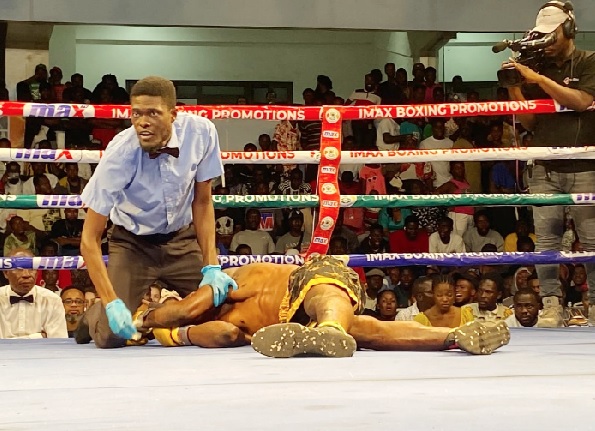Ghanaian boxing is in self-reflection, reeling from the tragic death of Nigerian boxer Gabriel Oluwasegun Olanrewaju, who collapsed mid-bout and was later pronounced dead after fighting Ghana’s Jon Mbanugu in a light heavyweight contest at the Bukom Boxing Arena last Saturday night.
The heartbreaking incident, the first-ever in a Ghanaian ring, has exposed serious concerns over the sport’s medical protocols and emergency preparedness, prompting urgent calls for tighter health and safety measures in the sport.
The 40-year-old Olanrewaju had been trading blows with Mbanugu in the third round when he suddenly lost balance, appeared disoriented, stumbled into the ropes and went down, triggering immediate medical intervention.
Despite the swift response by ringside physician Dr Edward Asante and emergency evacuation by paramedics to the nearby Korle Bu Teaching Hospital, Olanrewaju was declared dead on arrival.
The shocking incident has ignited a fierce debate around the adequacy of medical screening and emergency care protocol in Ghana’s professional boxing circuit.
Critics argue the system is riddled with gaps that could expose athletes to fatal risks.
The fight itself had been marred by chaos long before the opening bell. Initially scheduled for Friday at Bukom Park, it was cancelled at the last minute due to contractual disputes.
Olanrewaju and his team left for Nigeria the next morning, only for the boxer to alight at Aflao and make a dramatic U-turn back to Accra after agreeing to new terms.
Organisers scrambled to slot the bout into Saturday’s Ghana Professional Boxing League Fight Night 15 at the Bukom Arena. What was meant to be a redemption bout ended in a heartbreaking tragedy.
Regulatory scrutiny
The Ghana Boxing Authority (GBA), which sanctioned the bout, has maintained in a statement that Olanrewaju had provided the required medical documentation and was duly cleared to fight.
The GBA says it is awaiting the official autopsy report to determine the next steps.
However, the Nigerian Boxing Board of Control has launched a scathing critique of its Ghanaian counterpart, accusing the GBA of negligence for allowing the fight to go ahead a day later than scheduled and without adequately enforcing safety protocol.
Minister for Sports and Recreation, Kofi Iddie Adams, has pledged a full-scale probe into the incident, promising that “no stone will be left unturned”.
Insiders close to the post-mortem investigation told the Daily Graphic that Olanrewaju had an enlarged heart and was already predisposed to cardiac complications.
While he may have passed pre-fight medical checks, experts say the risk was ever-present.
Calls for reforms
The incident has galvanised calls from across Ghana’s boxing community for stricter and more comprehensive pre-fight medical checks, echoing international standards. Promoter Gordon Frimpong of Osebour Management and Promotions, who manages Mbanugu, described the tragedy as a pivotal moment for the sport.
“With what we witnessed at Bukom Boxing Arena, we—promoters, managers, and even the GBA—must take medicals seriously,” Frimpong told the Daily Graphic. “We should include tests such as MRI scans and ECGs, which international sanctioning bodies demand for Ghanaian fighters abroad.”
He also questioned whether Olanrewaju had received adequate rest or recovery time before stepping into the ring, suggesting fatigue and stress may have compounded his vulnerability.
Alex Ntriamoah Boakye of Box Office Promotions, one of Ghana’s leading promoters, also weighed in, defended the GBA’s protocol, but insisted improvements were necessary.
He noted that promoters are currently required to pay for ringside physicians, a standby ambulance, and at least four paramedics. Boxers must also undergo screening for infectious diseases such as HIV, syphilis, and hepatitis before weigh-ins.
However, he acknowledged that Ghana lags behind countries such as the UK, where the British Boxing Board of Control mandates MRI scans, ECGs, and thorough eye tests for all fighters.
“In the UK, pre-fight requirements include mandatory MRI and eye tests. Why are we not matching that standard here?”
“This tragedy must be the spark that compels us to raise our standards,” Mr Boakye said.
Another seasoned promoter, speaking on condition of anonymity, said that although such a tragedy is unprecedented in Ghana’s boxing history, it exposed glaring weaknesses in regulatory oversight. “We must dig deeper into what went wrong. Who sanctioned the fight? Was every protocol followed?” he questioned.
“This is a wake-up call for all of us. Ghanaian boxing cannot afford another incident like this.”
He also pointed to past cases involving Ghanaian fighters Napoleon Tagoe and Braimah Kamoko (Bukom Banku), who were denied the chance to fight for world titles abroad after failing mandatory eye tests —yet allowed to fight locally under less stringent conditions. “That’s the level of leniency we need to fix,” he lamented.
The way forward
The GBA, as the sport’s regulatory body, has come under intense scrutiny. It has a promotions committee responsible for vetting bouts before they are cleared by the GBA Executive Board.
As investigations unfold, the public deserves transparency on whether every safety box was ticked before Olanrewaju’s fatal bout was approved.
As the boxing fraternity reels from this devastating loss, there is a growing consensus that Ghana’s regulatory framework must evolve—urgently and comprehensively—to protect the lives of fighters who risk it all for glory in the ring.

